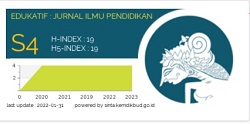The Influence of Emotional Intelligence on Employee Satisfaction in Islamic State University Syarif Hidayatullah Jakarta
Abstract
Keywords
Full Text:
PDFReferences
Afzaal, H.S. and Taha, A. (2013). An investigation of relationship among emotional intelligence, organizational commitment and job satisfaction: evidence from academics in Brunei Darussalam. International Business Research, 6(3), 217-228.
Bahl, S. (2016). Stress Management in Service Sector: A Case Study of Life Insurance Corporration in India. Jornal of Applied Management and Inverstments, 5(3), 137–148.
Bose, I. (2018). Employee Empowerment and Employee Performance: An Empirical Study on Selected Banks in UAE. Jornal of Applied Management and Inverstments, 7(2), 71–82.
Bose, I. (2018), “Employee Empowerment and Employee Performance: An Empirical Study on Selected Banks in UAE”, Jornal of Applied Management and Inverstments, Vol. 7 No. 2, pp. 71-82.
Chiva, R., & Alegre, J. (2008). Emotional intelligence and job satisfaction: Role of organizational capability, Personnel Review, 37(6), 680–701.
Ealias, A., & George, J. (2012). Emotional intelligence and job satisfaction: a correlational study. Research journal of commerce and behavioral science, 1(4). 37-42.
Kurniawan, A., & Syakur, A. (2017). The Correlation of Emotional Intelligence and Spiritual of Intelligence to Effectiveness Principals of Leadership. International Journal of Psychological and Brain Sciences, 2(1), 1-9.
Lopes, P.N., Grewal, D., Kadis, J., Gall, M., and Salovey, P. (2006), “Evidence that Emotional Intelligence is Related to Job Performance and Affect and Attitudes at Work”, Psicothema, Vol. 18 No. 1, pp. 132-138.
Meolong, L.(2005). Metodologi Penelitian Kualitatif. Bandung: Remaja Rosda Karya.
Mousavi, S. H., Yarmohammadi, S., Nosrat, A. B., & Tarasi, Z. (2012). The relationship between emotional intelligence and job satisfaction of physical education teachers. Annals of Biological Research, 3(2), 780-788.
Nahid, N. A. (2012).Teachers: emotional intelligence, job satisfaction, and organizational commitment. Journal of workplace Learning, 24(4), 256-269.
Ouyang, Z., Sang, J., Li, P., & Peng, J. (2015). Organizational justice and job insecurity as mediators of the effect of emotional intelligence on job satisfaction: A study from China. Personality and Individual Differences, 76, 147-152
Pandey, N., & Sharma, M. K. (2016). The Impact of Emotional Intelligence on Job Satisfaction: Evidence from a Large Indian Bank. IUP Journal of Soft Skills, 10(3), 7-23.
Shukla, A. & Srivastava, R. (2016), “Meta Analysis of the Relationship Between Emotional Intelligence and Different Behavioral Intentions”, Research Journal of Business Management, Vol. 10 No. 4, pp. 58-73.
Shukla, S., Adikari, B. & Mishra, N. L. (2013). Job Satisfaction: The Study of Management Teachers. IMR- Management Speak, 6(2), 52-56.
Soleiman, Y-J. and Fatemah, L-G. (2012). Teachers’ emotional intelligence and its relationship with job satisfaction. Advances in Education, 1(1), 4-9
Suharsimi, A. (2010). Prosedur Penelitian: Suatu Pendekatan Praktik. Jakarta: Rineka Cipta.
Syakur, A. (2018). Hubungan Kualitas Pelayanan Terhadap Kepuasan Mahasiswa dan Loyalitas Mahasiswa Ditinjau dari Model Pembelajaran di Akademi Farmasi Surabaya. Reformasi, 8(2), 100-108.
Syakur, A. (2017). Education For Sustainable Development (ESD) Sebagai Respon dari Isu Tantangan Global Melalui Pendidikan Berkarakter dan Berwawasan Lingkungan yang Diterapkan pada Sekolah Dasar, Sekolah Menengah dan Kejuruan di Kota Malang. Eduscience, 1(1), 37-47.
Syakur, A., Narimo, S., & Prayitno, H. J. (2022). The Effect of Democratic Leadership Style in Improving The Quality Higher Education of PGRI-Based Management in East Java. Edukasi Islami: Jurnal Pendidikan Islam, 11(01).
Syakur, A., & Panuju, R. (2020). Peran Strategis Public Relation dalam Pengembangan Reputasi Pendidikan Tinggi: Studi Kasus Promosi di Akademi Farmasi Surabaya. Briliant: Jurnal Riset dan Konseptual, 5(1), 128-136.
Sy, T., Tram, S., & O’Hara, L. A. (2006). Relation of employee and manager emotional intelligence to job satisfaction and performance. Journal of vocational behavior, 68(3), 461-473. 41.
Wong, C. S., & Law, K. S. (2002). The effects of leader and follower emotional intelligence on performance and attitude: An exploratory study. The leadership quarterly, 13(3), 243- 274.
Zeidner, M., Matthews, G., & Roberts, R. D. (2004). Emotional intelligence in the workplace: A critical review. Applied Psychology, 53(3), 371-399.
DOI: https://doi.org/10.31004/edukatif.v4i5.3575
Article Metrics
Abstract view : 195 timesPDF - 83 times
Refbacks
- There are currently no refbacks.
Copyright (c) 2022 Siti Nurhasanah, Elvira Sitna Hajar

This work is licensed under a Creative Commons Attribution-ShareAlike 4.0 International License.






1.png)